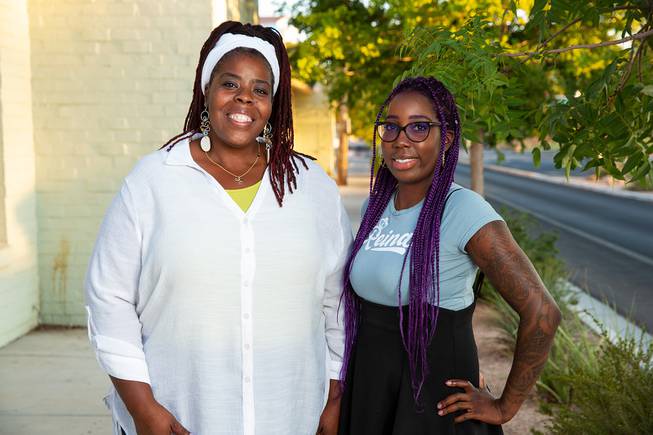
Tameka Henry, left, and Cheyenne Kyle, right, of the Obodo Collective Las Vegas pose for a portrait outside the Historic Westside School Tuesday, Sept. 7, 2021.
Wednesday, Sept. 22, 2021 | 2 a.m.
In Cheyenne Kyle’s home, everything has a second life.
Her plastic grocery store bags become shower caps while her butter containers transform into food storage containers.
Kyle, programs coordinator for the Obodo Collective, said people of color have been practicing conservation efforts for years, even as they may not be familiar with the fancier or more technical terms often applied to their actions.
“It’s something that we do in practice, but we aren’t aware of it as a concept,” Kyle said. “When you cross over the threshold into white America, you have these words like ‘upcycling’ and stuff like that, and it’s been what we’ve been doing forever.”
Local organization the Obodo Collective primarily works in the Historic Westside of Las Vegas to educate residents on issues like food security.
Informing residents who may not have full access to education on the environmental justice movement is key to the collective’s work, collective executive director Tameka Henry said.
“We need more allies in this work,” Henry said. “We will learn together and grow together and just help people become the best advocates for themselves, for their families and for their community.”
In the face of studies that confirm incoming, drastic alterations in the climate — as well as the impact these changes will have on low-income people and people of color — local organizations are prioritizing climate justice by connecting with the most vulnerable populations. Climate justice meshes the fight against climate change with issues of social inequity. Community leaders of color, like Kyle and Henry, lead these campaigns in Las Vegas.
On a national scale, President Joe Biden has vowed to place fighting environmental racism at the core of his plan to combat climate change, underscoring the need to protect impoverished and minority communities that are exposed to more pollution and other harmful climate effects than better-off communities.
Locally, the collective is attempting to create a community garden to show residents how to grow fresh produce. Henry, who lives in the Historic Westside, said the area is populated with gas stations and fast-food restaurants, neither of which sell healthy food.
While bringing a healthy grocery store like Sprouts or Trader Joe’s to the neighborhood could be effective, a more productive route would be to teach residents simultaneously about the healthy food they would be buying from these stores, Kyle said. Japanese eggplants, for example, might not be part of a resident’s diet and therefore they would not know how to prepare it, she said.
“I do feel like it’s integral for all people to know how to feed themselves, but especially where people are underserved,” Kyle said. “It helps them to be less reliant, and that does something to build up the morale of those individuals.”
Make the Road Nevada, a nonprofit that connects with working class and immigrant communities, is also promoting environmental justice in underserved Las Vegas communities.
Last week, the group hosted a resource fair for street vendors near its headquarters on Bonanza Road. The fair provided the COVID-19 vaccine, information on housing, banking guidance for undocumented immigrants and other resources. The first 15 recipients of the vaccine received a $100 gift card to the grocery store Smith's, said Audrey Peral, organizing director of Make the Road Nevada.
Street vendors, who sell goods such as produce and souvenirs, are some of the most susceptible to increased temperatures because of climate change in Las Vegas, according to Make the Road Nevada. Some sell outside all day, setting up shop on the side of busy roads. Many of the vendors are undocumented immigrants, Peral said, and often do not know how to access resources to help their businesses and themselves.
“Part of the way we’re approaching environmental justice is very much through a people-centered lens,” Peral said. “The idea is for us to continue to uplift and empower and engage, in the future come together to talk about policy and how can we push for a greener and safer and better Nevada.”
Street vendor Letty Cruz, who sells clothing from Letty’s Construction Ware, said she heard about the event through Peral. The availability of vaccines and housing information appealed most to her, she said.
“I don't currently own a house, but I'm seeking to,” Cruz said. “There’s all the requirements and different programs, so I can learn more about that.”
Las Vegas resident Heliodoro Ramirez said his sons had been urging him to receive the vaccine. When he saw them available at the fair, he felt motivated to get his first dose.
Ramirez said he would speak with LaLo Montoya, Make the Road Nevada’s housing organizer, about a CARES Housing Assistance Program application — another resource at the fair.
“Something in my heart was pounding and telling me I should go back,” he said in Spanish, translated by Peral. “[I’m] so sure that God sent [me] because there’s other resources that [I] really needed.”
The fair also featured Fifth Sun Project, a local nonprofit that raises money for community members in need. In July, the group raised approximately $1,600 through a dance contest, and at Make the Road's fair, the group distributed all the funds to street vendors.
“I think it’s important to let the community know that there’s resources for them,” said Xochitl Garcia, vice president of the Fifth Sun Project. “I know for a lot of people in low-income neighborhoods, they’re unaware of the resources that are available to them, so I think it’s really important to have all these things available.”
